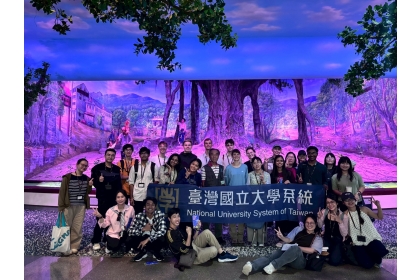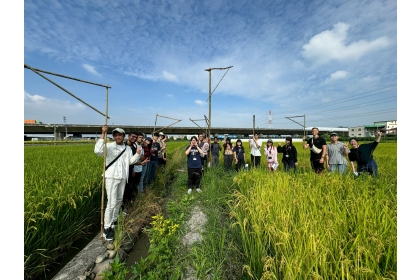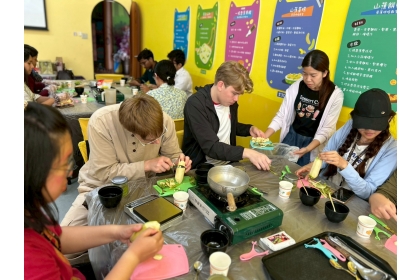NUST “Sustainable Agriculture Education Tour” Concludes Successfully in Two Sessions
2025-11-10
興新聞張貼者
Unit秘書室
343
Organized by the Office of International Affairs (OIA) at National Chung Hsing University (NCHU) under the National University System of Taiwan (NUST) International Working Circle, the “Sustainable Agriculture Education Tour” successfully held two sessions on October 3 and October 30, 2025. The first session brought together 22 students—including six from National Changhua University of Education (NCUE) and National Yunlin University of Science and Technology (YunTech). The second session engaged 17 students, with one participant from National Taichung University of Education (NTUE), demonstrating the remarkable achievements in cross-university collaborative learning and the effective integration of educational resources by NUST working circle, underscoring vibrant cross-campus collaboration.
Session I – Jiji, Nantou: SDG-aligned learning linking the banana sector and leopard cat conservation
Visits included the “Jiyuan Fruit Tourism Factory” and the “Taiwan Biodiversity Research Institute”. Framed by SDG 12 (Responsible Consumption and Production), SDG 15 (Life on Land), and SDG 4 (Quality Education), students examined value-chain thinking from agriculture product processing and packaging to logistics and educational outreach. The program further explored how the banana industry can collaborate with habitat-friendly practices for the leopard cat, turning a globally familiar and year-round Taiwanese crop into an accessible entry point for systems thinking and place-based conservation.
Session II – Wufeng, Taichung: Whole-food utilization and eco-friendly practices across the rice sector with black-winged kite stewardship
The group visited the “Wufeng Minsheng Story House”, the “Wufeng Farmers’ Association Winery”, and “Wufu Elementary School”. Using “whole-food utilization” and “eco-friendly” approaches, students connected rice-industry by-product reuse, habitat enhancement, and black-winged kite conservation. The tour also promoted healthy, safe diets and the preservation of local flavors—encouraging students to practice sustainability in everyday life and aligning with SDG 2 (Zero Hunger) and SDG 12 (Responsible Consumption and Production).
The tour emphasizes field-based, transdisciplinary learning and systems thinking, setting a successful benchmark for the cross-campus international education exchanges promoted by the National University System of Taiwan (NUST). In real-world contexts, students examined resource circularity, habitat conservation, and community partnerships, and through mixed cross-campus teams and mission-based tasks linked classroom learning to local needs. This initiative not only substantially deepened system-wide collaboration within NUST, but also effectively broadened students’ international outlook and hands-on experience in sustainability, yielding strong results. Building on this success, the team will continue to expand partnerships with local communities and industries to build a sustainability learning network that is locally grounded and globally impactful.
Session I – Jiji, Nantou: SDG-aligned learning linking the banana sector and leopard cat conservation
Visits included the “Jiyuan Fruit Tourism Factory” and the “Taiwan Biodiversity Research Institute”. Framed by SDG 12 (Responsible Consumption and Production), SDG 15 (Life on Land), and SDG 4 (Quality Education), students examined value-chain thinking from agriculture product processing and packaging to logistics and educational outreach. The program further explored how the banana industry can collaborate with habitat-friendly practices for the leopard cat, turning a globally familiar and year-round Taiwanese crop into an accessible entry point for systems thinking and place-based conservation.
Session II – Wufeng, Taichung: Whole-food utilization and eco-friendly practices across the rice sector with black-winged kite stewardship
The group visited the “Wufeng Minsheng Story House”, the “Wufeng Farmers’ Association Winery”, and “Wufu Elementary School”. Using “whole-food utilization” and “eco-friendly” approaches, students connected rice-industry by-product reuse, habitat enhancement, and black-winged kite conservation. The tour also promoted healthy, safe diets and the preservation of local flavors—encouraging students to practice sustainability in everyday life and aligning with SDG 2 (Zero Hunger) and SDG 12 (Responsible Consumption and Production).
The tour emphasizes field-based, transdisciplinary learning and systems thinking, setting a successful benchmark for the cross-campus international education exchanges promoted by the National University System of Taiwan (NUST). In real-world contexts, students examined resource circularity, habitat conservation, and community partnerships, and through mixed cross-campus teams and mission-based tasks linked classroom learning to local needs. This initiative not only substantially deepened system-wide collaboration within NUST, but also effectively broadened students’ international outlook and hands-on experience in sustainability, yielding strong results. Building on this success, the team will continue to expand partnerships with local communities and industries to build a sustainability learning network that is locally grounded and globally impactful.




